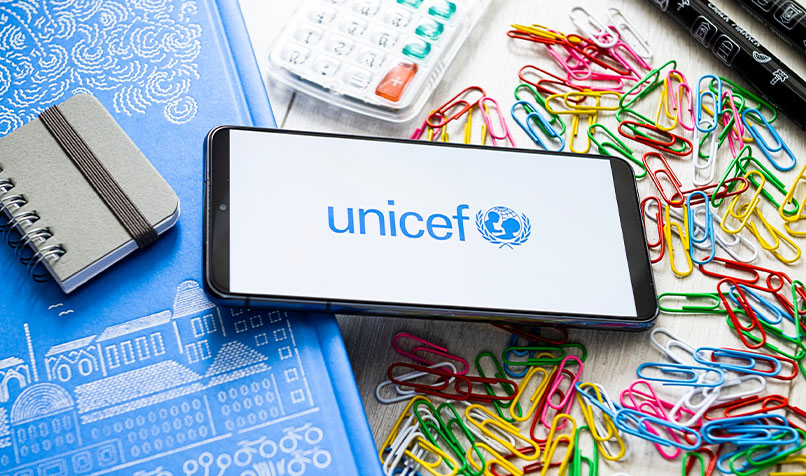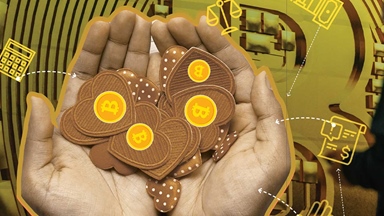Loading component...
At a glance
By Gary Anders
Charities have traditionally relied on volunteers to help collect physical cash donations, but now crypto technology is making it easier for charities to collect donations electronically.
Thanks to the growth in blockchain-based crypto assets, a growing number of charities are now casting their donation nets even wider. In addition to conventional currency, many charities are also accepting contributions paid in cryptocurrency, such as Bitcoin and Ethereum, as well as other types of crypto assets, such as non-fungible tokens (NFTs).
Two of Australia’s biggest charities, UNICEF Australia and Save the Children, promote crypto asset donations. Both accept donations made in more than 50 different cryptocurrencies.
These charities have formed fundraising collaborations with US-based crypto donations platform The Giving Block and crypto wallet custodian Gemini. Within the blockchain industry, they are known as crypto assets secondary service providers.
Regulation and risk

The Australian Taxation Office (ATO) has estimated that about one million Australians, or 5 per cent of the population, have already invested in crypto assets.
It is reasonable to assume that the pool of crypto investors, and potential crypto donors to charities, is likely to increase over time.
This presents significant future funding sources for charities that accept crypto donations, but also a range of regulatory and governance challenges, as well as possible financial risks.
The Australian Charities and Not‑for‑profits Commission (ACNC), Australia’s national regulator of more than 50,000 registered charities, has indicated crypto asset regulation may become a growing concern for charities that consider receiving, managing and reporting on crypto assets.
The ACNC has developed detailed guidance for Australian charities around the handling of crypto asset donations.
Anna Longley, assistant commissioner general counsel of the ACNC, says that there is currently no legislation in respect to whether charities can or cannot accept crypto donations.
“The general rules apply in terms of the donation of assets to charities. I think it is fairly clear that cryptocurrency is not regarded as currency – it is an asset. Therefore, charities have to treat it the same way that they would treat any donations of assets.
“They would have to value them at the time of receipt,” Longley says.
Digital Finance: The Digital Finance Ecosystem micro-credential
Cyrpto donation implications
The ATO has outlined rules for organisations that have “deductible gift recipient” status, regarding claiming deductions from the donation of crypto assets.
Crypto assets are treated as investments, so all transactions including acquisitions, disposals, exchanges and swaps are regarded as capital gains tax events.
The ATO has had a data-matching program in place to track cryptocurrency transactions since early 2019, and it receives bulk records from Australian designated service providers as part of the program.
Data provided to the ATO includes cryptocurrency wallet information, such as names and addresses, bank details, and transaction information, in relation to purchases sales and transfers.
The ATO also uses information collected from international tax jurisdictions to identify when cryptocurrency transactions are converted to a foreign currency or repatriated back to Australia. This includes the Common Reporting Standard (CRS), the Fair and Accurate Credit Transactions Act (FACTA) from the US, and data collected via Double Taxation Agreements (DTA).
"The general rules apply in terms of the donation of assets to charities. I think it is fairly clear that cryptocurrency is not regarded as currency – it is an asset. Therefore, charities have to treat it the same way that they would treat any donations of assets."
Longley says all charities that accept or intend to accept crypto donations need to be aware of the potential tax consequences around cryptocurrency transactions, as well as other risks such as crypto asset volatility.
Cryptocurrencies are renowned for experiencing large daily price swings for a wide range of reasons.
In November 2022, the US$32 billion (A$46.5 billion) collapse of FTX, the world’s second-largest cryptocurrency exchange, sent the global crypto market into chaos.
The trading prices of Bitcoin, Ethereum and many other currencies fell by more than 15 per cent in just a few hours amid concerns that other cryptocurrency exchanges – and some of the 12,000 or so digital currencies available to investors around the world – could also collapse.
About 30,000 Australian investors using the FTX exchange – a secondary service provider used for cryptocurrency trading – are reported to have collectively lost more than A$40 million.
During November 2022, the overall value of the global cryptocurrency market fell by more than 70 per cent from its level 12 months before, prompting fears of a severe “crypto winter” – a prolonged downturn in cryptocurrency values.
Secondary service provider risks

The ACNC lodged a submission with the Australian Government last May about the licensing regime for crypto asset secondary service providers.
The submission states, “This risk is at the centre of the ACNC’s interest in crypto regulation. In line with the objects of the ACNC Act, our priority is to ensure crypto assets are managed properly and transparently by charities, but that the associated regulations should not impose an unreasonable administrative burden on charities.”
Longley says charities need to be mindful of the volatility of cryptocurrencies if they plan to hold them for any length of time.
“Charity-responsible persons have a requirement to govern in the best interests of the charity, so that is something we would say they have to take into account in accepting cryptocurrency donations.
“What is in the best interest of the charity? It may be cryptocurrency donations are a good thing, but holding them for a period of time is a riskier proposition,” Longley explains. The same applies to any charities wanting to invest in crypto assets.
"Unless you understand cryptocurrency or you are engaged with an adviser who understands cryptocurrency, I think that it’s likely to be a higher-risk asset donation than others that have more of a fixed value."
“I haven’t heard, though, of an instance where we do have charities investing in cryptocurrency. That doesn’t mean it doesn’t occur – we just haven’t heard about it yet. Nor am I aware of charities paying for services or expenses using cryptocurrency,” Longley says.
Longley also agrees that some charities could be biting off more than they can chew by taking on crypto assets – particularly smaller charities that have limited resources and expertise.
“That is my preliminary view – that unless you understand cryptocurrency or you are engaged with an adviser who understands cryptocurrency, I think that it’s likely to be a higher-risk asset donation than others that have more of a fixed value.
“The general donation rules would apply in respect of the donors, and I know that from some of the entities that we’ve been speaking with, their journey into cryptocurrency is often driven by their donors who want to donate in that format,” Longley says.
How tax laws apply to your cryptocurrency gains
Advice and responsibilities
Longley says it's important for charities to seek their own professional advice as to whether accepting crypto asset donations is right for them.
Rather than take on crypto assets, some charities may prefer to convert crypto donations into Australian dollars or another currency at the time the donation is made.
“I expect that any guidance we would put out would be an overview of the types of risks that we see the charity has to manage,” Longley says.
For example, under the ACNC’s Governance Standard 5: Duties of Responsible People, charities need to ensure they have directors, governors, trustees or management committee members able to manage the financial affairs of the charity responsibly.
This includes having processes in place for the responsible management of funds.
“We would expect that if there was entry into cryptocurrency markets, that they’ve got a record of the decisions that they’ve taken and why,” Longley says.
“Given that we look more to the governance of charities, we want to know that at the time decisions were considered properly and recorded properly.”

